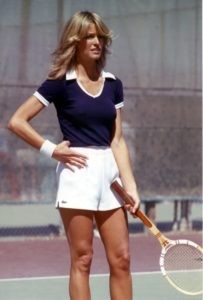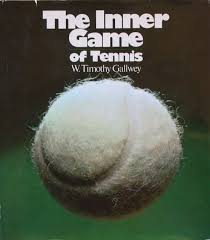Changeover: A Tennis Tale (Part 3)
In the spirit of Wimbledon, which began this week, I present a short story I wrote a decade ago, but have recently updated. Enjoy. And get out there and play tennis this summer.
Love-6, love-5. Changeover. Chet had won one point in the two games, a double fault when his opponent went for and missed a second serve ace by an eighth of an inch. As they switched ends, Chet’s opponent went directly to the fence and started laughing with his harem, an assemblage now swelled in numbers and attractiveness. He kissed one of the girls and another let him listen to a special song on her phone.
Chet sat down. It was over. His high school tennis career was over and he was finishing it losing love and love, totally alone, in a humiliating public arena. He reached into his bag looking for a solid candy bar and instead found Tricia’s unopened card. He pulled it out and tore open the envelope. Tricia had painted a watercolor tennis scene on the cover. Inside, she wrote, “Good luck at district. I wish I could be there.” Chet put the card back into the envelope. He went back into the bag for the candy bar. Instead, he pulled out a hardback book, The Inner Game of Tennis. Chet had skimmed it recently for his history project for Mr. Love’s American Civilization class, which entailed researching some lost aspect of American popular culture, collecting its artifacts, writing a ten-page paper, and making a presentation to the class utilizing the artifacts. The working title for Chet’s project was “The Rise and Fall of Tennis in America” and it was a historical study of tennis’ meteoric rise in popularity in the 1970s, the Studio 54 days of golden rivalries between Connors, McEnroe and Borg, the sexy placid domination by Chris Evert, the feminist landmark when Billie Jean King routed Bobby Riggs in the Battle of the Sexes on prime time television while Howard Cosell provided color commentary, when the Rolling Stones played, when Virginia Slims cigarettes sponsored the women’s pro tour, when the New Yorker routinely ran long fact pieces on tennis.
 Mr. Love had suggested the topic to Chet and Chet was enthusiastic about it, but unsure what constituted tennis artifacts, or where he would find them. To this, Mr. Love said, “Go to thrift stores and notice patterns.” He also told Chet to discover the identity of the last male or female tennis player to win a Grand Slam singles event using a wooden tennis racket. This information might prove interesting to include in the paper, perhaps in the form of a trivia question in the opening paragraph.
Mr. Love had suggested the topic to Chet and Chet was enthusiastic about it, but unsure what constituted tennis artifacts, or where he would find them. To this, Mr. Love said, “Go to thrift stores and notice patterns.” He also told Chet to discover the identity of the last male or female tennis player to win a Grand Slam singles event using a wooden tennis racket. This information might prove interesting to include in the paper, perhaps in the form of a trivia question in the opening paragraph.
Several weeks ago, Chet and Tricia had driven to Portland in her brown Pinto and hit ten thrift stores and it had been the best fun time of his life. After three stops, patterns emerged: the stores were full of wooden tennis rackets, many screwed in their presses, and also full of tennis instruction books, many never opened. Further patterns emerged: one racket model dominated—the Jack Kramer Autograph; one instruction book dominated—The Inner Game of Tennis. Jack bought a Kramer in mint condition for $5 and a heavily annotated The Inner Game of Tennis for $1.
Chet barely cracked the book and was certain the it would not end up in his paper’s bibliography. But now, The Inner Game of Tennis rested in Chet’s hands during a changeover with Chet behind love-6, love-5. He opened it at random and read one of the underlined passages, “Observe how you feel if you fail.” He turned to another page, “Only when the mind is still is one’s peak performance reached.” Then another, “It is a painful process to fight one’s way out of a deep mental groove.” And finally, “Let the flower grow.”
Chet observed his failure: there was no one who cared for him watching his last match as a high school tennis player. Chet stilled his mind: he heard nothing but the distant sound of a crow upset at something. Chet considered his pain: his reclusive groove was Crater Lake in depth, totally unknown in origin to him, and about ready to ruin his adulthood. He thought about a flower growing: could one actually burst forth from underneath the court he was now losing everything on? Chet thumbed the book’s pages again and came across a double starred passage: “Habits are statements about the past, and the past is gone.”
And just like that, Chet knew he must let go of everything he was as a solitary, yet successful young man, and pedestrian, yet successful tennis player. He did not care so much about the tennis but he did care about his family and Tricia and he was tired of being alone most of the time, a habit he orchestrated with superb clandestine skill all throughout high school.
Yes, it was time to let all of that go. It had never served any useful purpose. It certainly did not attract friends or dates, except Tricia, who had asked him out during journalism class in the winter, and later told him she did so because he had some mysterious loner quality that attracted her and it was the antithesis of the football jock she had recently broken up with. She was on the swim team and Chet loved sitting by himself in the bleachers while watching her freestyle in the humid Fir City Swim Center. She made it to state that winter, in three events, but Chet did not drive the hundred miles to see her compete.
Tricia as girlfriend had been a fluke winner, he was a perpetual mishit, and he knew now, at the moment of his competitive disintegration, that he must entirely reinvent himself as a human being. He had approximately a minute to do it because how he faced his greatest opponent in the last game of the last set of the last match of his high school career was the beginning of it all.

